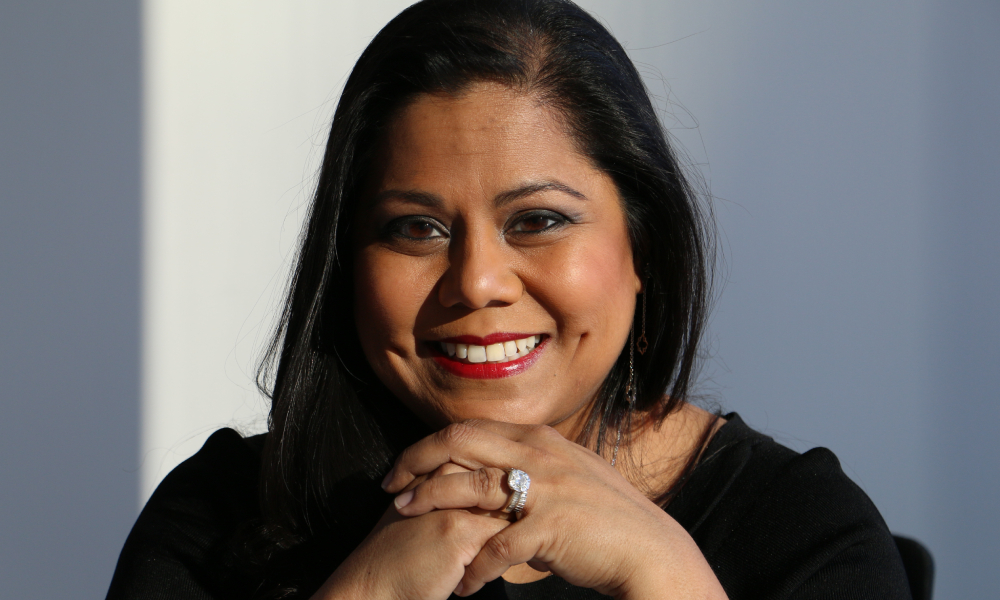
‘I am happy because I love what I do, … and the clients I get to serve,’ says Elizabeth Dipchand

In a pandemic era, our homes have become our offices and our working hours may be harder to contain. Litigating remotely also presents its own challenges – and rewards.
But a particular challenge to law firms is in how they treat female lawyers, says Elizabeth Dipchand, a partner in Dipchand LLP in Toronto who practises intellectual property litigation.
The focus shouldn’t be on “accommodating” or treating women differently, she says, but rather on reframing of how firms operate, and redefining how they can operate successfully compared to how firms have traditionally been run.
Dipchand will be a speaker at Key Media’s Women in Litigation webinar on May 12, when she’ll discuss acceptance in the workplace and changing mindsets in the modern legal firm. She is also an Excellence awardee in the Female Trailblazer category of the 2021 Canadian Law Awards.
“The language shouldn’t be about accommodation,” she says, which is a “norm” that has arisen out of traditional, gendered roles where men are predominantly doing paid work, and women have the larger share of household and childrearing responsibilities.
“We have to make a concerted and conscious effort to reframe how we think about these things; I don’t need flexibility, I need the tools to get out of my own way, and have people in front of me get out of the way. ‘We need to help you’: there’s a pejorative aspect” to that.
Law firms need to be challenged to consider their underlying values, says Dipchand. “What are the values underpinning the way you serve clients? If you come at it from a service perspective, you're thinking about what's best for your clients,” which relates to how best the lawyers can serve them.
“It feels like a very abstract connection to how you practise law, but … it'll dictate what becomes acceptable conduct and behaviour in your firm that may not look like a nine to five, or a 7 a.m. to 12 a.m.,” she says. “It may look like someone who has an hour in the afternoon to make sure an elderly parent has medicine, [or] instead of showing up in courtroom, you show up on screen. These are different ways of practising that don’t necessarily look the same” as they did when Dipchand started practising at a large Bay Street law firm 17 years ago.
“It's a mindset, and it's an attitude that you have to bring your whole firm along to, and that you have to communicate to your clients, because you cannot serve everyone in the way that they want to be served. And if you can't do it, don't.”
This means accepting clients that are a good fit to one’s practice, says Dipchand, who calls her job “a blast.”
She asks two questions before accepting new clients: “number 1, what brings me joy personally and professionally is learning, connection with people. So, I first ask, what can I learn? I'm an IP lawyer, my background’s in genetics and biochemistry, but I love learning about different tech, across the gamut.
“Second, do I like you? Are we connected? … Am I going to be able to make an impact on your business? Will it matter to you? Because helping people and serving people really, really matters to me, [and] the money comes because I’m doing something that I love.” This can mean referring potential clients elsewhere so that they’re in the right hands and the best fit is achieved.
This pandemic period has also presented opportunity, she says. For example, “it’s given us an opportunity to connect in certain ways” remotely, including with her “Amazing Women,” a group of 40 to 50 private practice lawyers across the country who now meet via Zoom once a quarter. Dipchand used to host these meetings in her office, which contains a bar and a pool table, and is “specifically designed to promote connectivity and community engagement.” But now, rather than hosting just 10 to 12 Toronto-area lawyers, she can host 40 to 50 from across the country, from Vancouver to Halifax, for (remote) drinks and shop talk.
And that’s not to mention the opportunity to save time in her litigation career, where she says that, with remote hearings, she can now easily get through three cross-examinations per day.
As for work-life balance, Dipchand has been working from her office in Toronto’s Simpson Tower on Bay Street, for the entire pandemic, as it’s spacious and she and her husband, who is also a partner in the firm, live nearby. The majority of her team are working remotely, though, and “this unfortunately becomes a trap; it is so easy to keep working.”
She has emphasized “the need to be mindful about the time on the clock” and promotes “getting up and moving on a schedule that works for each person. It has become particularly important to make sure that people are taking vacation time to unplug and recharge, even if that means a vacation to the park and back every day.”
Dipchand also finds it effective to carve out “a strict no-screens time” for her job or her personal life – “no computer, no phone, no tablet. Nothing. Believe it or not, the world goes on without my input and people who need to reach me know that they can always call. And, pleasant surprise, some of them even do!”